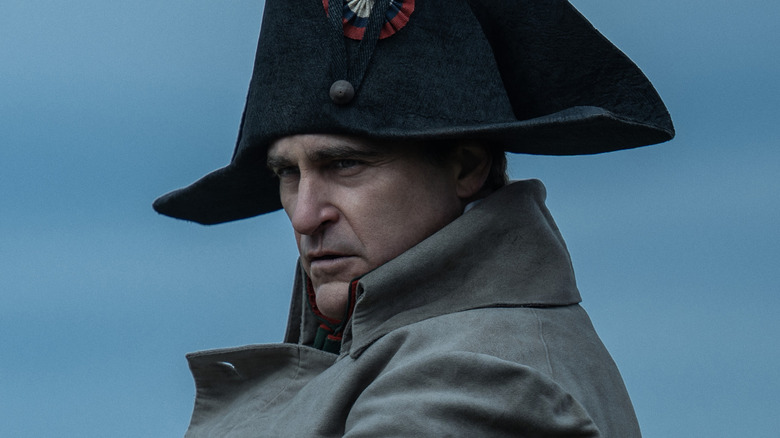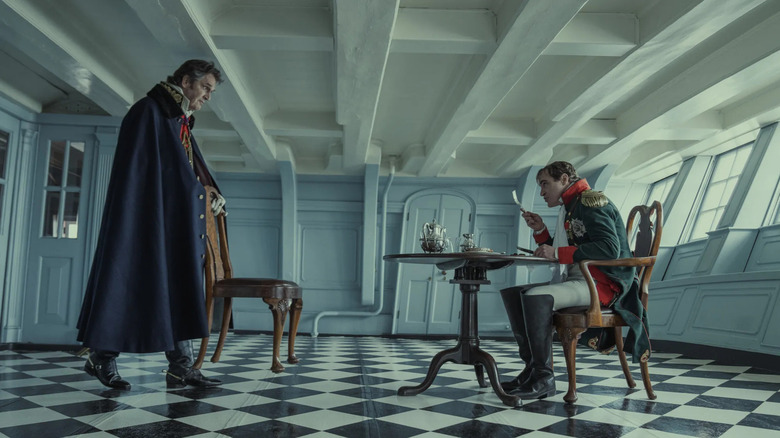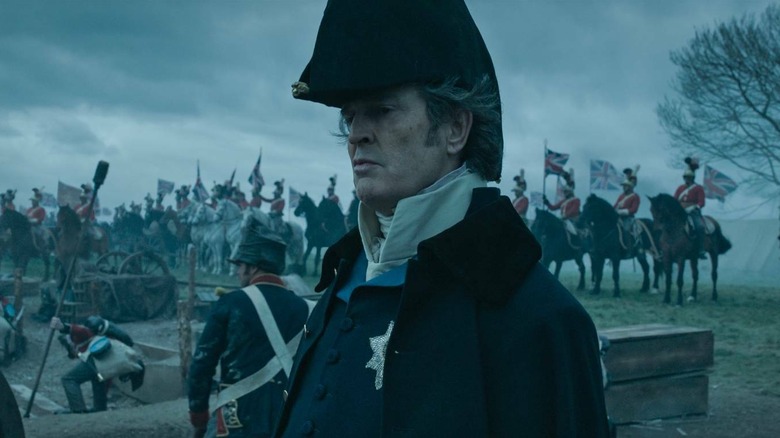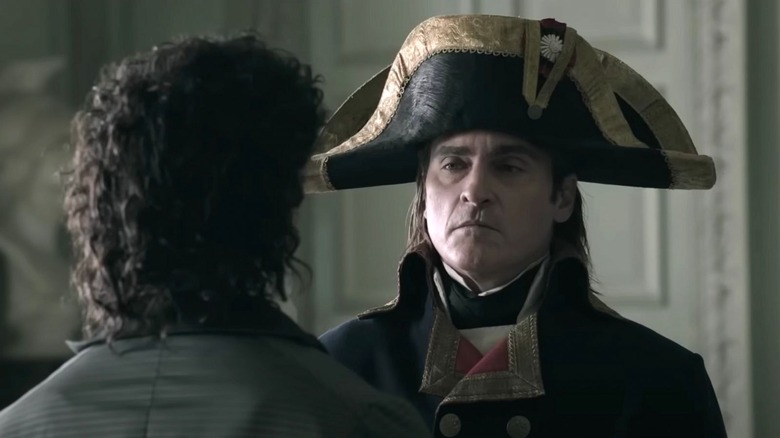That 'Breakfast' Line In Napoleon Means More Than You Think
At the end of "Napoleon," Wellington (Rupert Everett) meets with the captured Napoleon (Joaquin Phoenix) on a ship after the Battle of Waterloo. In the exchange that follows, the French emperor is finishing his breakfast. He congratulates his captor on the quality of the food, saying, "And this breakfast. Now I know why you have such a successful navy."
In passing, this appears to be a banal line uttered during the high-stakes politics of wartime diplomacy. But it's also a backhanded comment referencing the incredible health of the average British seaman at the time. It makes sense, too, coming from a commander who was well aware of the importance of good food, as well as the insurmountable power of the Royal Navy of Great Britain.
One aspect of the Napoleonic era that doesn't get much attention throughout "Napoleon" is the navies of France, Britain, and Spain, all three of which played integral roles in the rise and fall of the French dictator. A few ships are shown in the earlier sequences of the movie, and the ending shows the titular protagonist sailing around on vessels to and from his exiles, but in between, we see nothing of the epic naval engagements that define those times.
This isn't surprising, considering how much content Ridley Scott tried to cram into a single story. Even so, the famed historical drama director managed to squeeze in that one reference to the British navy's diet toward the end of the film. It's a fun shout-out for any history buffs who are paying attention, especially when you consider just how well the British seamen ate compared to their fellow 19th-century humans.
The Napoleonic British Navy was a paragon of health
The Napoleonic era comes hot on the heels of the age of exploration, when European sailors spread out across the globe, often sailing for months and even years cooped up in rickety wooden ships. This led to a lot of struggles with poor health. Scurvy is the famous malnutritional disease that was a scourge of sailors, but a lack of vitamin C was just the tip of the iceberg. Shortages and limited food choices were common, especially amongst commercial shipping where merchants were more likely to reduce food quality to improve profit margins.
As naval leaders gained more experience, they began feeding their sailors better, and by the time of the late 18th and early 19th centuries (when "Napoleon" takes place), the British had become particularly adept at keeping their seamen in good health. In fact, they are historically considered to be some of the most nutritiously well-fed individuals in the world at the time.
British sailors were fed a well-rounded diet that included biscuits, beef, pork, peas, oatmeal, butter, and cheese. At times, these would be swapped out depending on where the ships were stationed (chickpeas might be used instead of peas, for instance). Regardless of the specific ingredients, the diet was significantly better than land-based fare, and the food was kept flowing at all times and on all British ships. Did we mention that alcohol was also a staple, with sailors getting a gallon of beer, a pint of wine, or half a pint of spirits per day? Life at sea might not be easy, but the dinner table was to die for.
The British Navy's food supplies factored into defeating France
The wide variety of different foods available to British sailors wasn't a geographically limited phenomenon. The Royal Navy took great pains to supply all of its ships throughout its global empire with necessary provisions on a regular basis. This was a serious task, as the number of individuals that had to be fed well every day included 140,000 sailors toward the end of the Napoleonic era.
That means hundreds of tons of food had to be delivered onto floating ships every year. This is a feat that prompted Roger Knight, a professor of naval history at Greenwich University, to declare that this wasn't just impressive; the high-quality stocking of the Royal Navy was a legitimate factor in its success against its French and Spanish counterparts, in the scholar's estimation.
To quote Knight's own words, "The mass feeding of men was an unqualified success for the Royal Navy, one of the reasons it triumphed over the navies of France and Spain." He added, "Far from surviving on weevil-filled biscuits, hundreds of thousands of men received a carefully planned diet of food and drink, wherever they were in the world."
Napoleon knew a thing or two about food, too
The immaculate feeding of the British Royal Navy was doubtlessly due in part to the massive maritime infrastructure that Great Britain established to supply its seaborne military. However, there's no doubt that the admirals in charge of the ships also often took individual pride and responsibility in properly providing for their men. The legendary British Admiral Lord Horatio Nelson is famous for the care that he invested in how his men ate. He is even on record for personally placing some of the orders for their food. Other British admirals were similar in nature.
Even Napoleon was well-known for understanding the impact that proper victualling had on military efforts — whether they were on land or at sea. The man is well known for saying, "An army marches on its stomach." While that particular quote may be apocryphal, the French leader's ability to provide massive armies with the food and supplies required to fight from the fields of France to the sands of Egypt and even into the frozen heartland of Russia shows that he had a genius for supply chain management. It's no wonder Ridley Scott snuck in that quick little line, hypothesizing that if Napoleon ate the food of the British navy, he would probably have been the first one to credit it not just as a culinary treat but as an element of military success.



